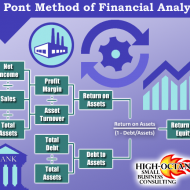Posted by Managementguru in Management Accounting
on Mar 24th, 2015 | 0 comments

What are the advantages and limitations of ratio analysis? Advantages: It is an important and useful tool to determine the efficiency with which working capital is being managed in a business organization. It is a ‘health test‘ for a business firm in that it can gauge whether the firm is financially healthy or not. It aids the management of business concern in evaluating its financial position and performance efficiency. It clearly shows the trend of changes in the market position (upward, downward or static), as it covers a number of previous accounting (financial) periods. The progress or downfall of a firm is clearly indicated by this analysis. It assists in preparing financial estimates for the future (financial forecasting). It facilitates the task of managerial control to a great extent. It helps the credit suppliers and investors in deciding upon a business firm as a potential investment outlet or desirable debtor. Ideal or Standard ratios can be established which can be used as reference points of comparison for a firm’s progress over a period of time. It communicates important information with relation to financial strength, earning capacity, debt (borrowing) capacity, liquidity position, capacity to meet fixed commitments, solvency, capital gearing, working capital management, future prospects etc. of a business concern. This analysis is also useful for bench marking purpose- to compare the working result and efficiency of performance of a business enterprise with that of other firms engaged in the same industry (inter-firm comparison). It helps the management to discharge their basic functions of planning, coordinating, controlling etc. It serves as an instrument for testing management efficiency too. It acts as a useful tool for deciding on certain policy matters. Limitations: Accounting ratios calculated based on ratio analysis will be correct only if the accounting data on which they are based are correct. It is only an analysis of past financial data. In certain cases ratio analysis might prove to be misleading with regard to profits. Continuous fluctuation in price levels ( or, purchasing power of money) seriously affect the validity or comparison of accounting ratios calculated for different accounting periods and make such comparisons very difficult. Comparisons become difficult also on account of difference in the definition of several financial (accounting) terms like gross profit, operating profit, net profit etc. There is lot of diversity in practice as regards to the measurement of ratios. Different firms use different accounting methods and the validity of comparison is severely affected by window dressing in the basic financial statements. A single ratio will not be able to convey much information. This analysis only gives part of the total information required for proper decision-making. This should not be taken as a substitute for sound judgement. It should not be overlooked that business problems cannot be solved mechanically through ratio analysis or other types of financial analysis. Follow ManagementGuru Net’s board Accounting – Financial and Management Accounting on...

Posted by Managementguru in Financial Management
on Dec 19th, 2014 | 0 comments

Meaning and Definition of Finance Meaning of Finance The science that describes the management, creation and study of money, banking, credit, investments, assets and liabilities. The financial systems include the public, private and government spaces, and the study of finance and financial instruments, which can relate to countless assets and liabilities. Finance is divided into three distinct categories: public finance, corporate finance and personal finance, all three consisting of many sub-categories. The one word which can easily substitute finance is “exchange.” Finance is nothing but an exchange of available resources. Finance is not restricted only to the exchange and/or management of money. A barter trading system is also a type of finance. Thus, we can say, Finance is an art of managing various available resources like money, assets, investments, securities, etc. Some Definitions of Finance The concept of finance includes capital, funds, money, and amount. But each word has its unique meaning. Studying and understanding the concept of finance becomes an important part of the business concern. Definition of Business Finance According to the Wheeler, “Business finance is that business activity which concerns with the acquisition and conversation of capital funds in meeting financial needs and overall objectives of a business enterprise”. According to the Guthumann and Dougall, “Business finance can broadly be defined as the activity concerned with planning, raising, controlling, administering of the funds used in the business”. In the words of Parhter and Wert, “Business finance deals primarily with raising, administering and disbursing funds by privately owned business units operating in non-financial fields of industry”. The term finance comes from the Latin “finis” which means end or finish . It is a term whose implications affect both individuals and businesses, organizations and states it has to do with obtaining and using or money management – Ivan Thompson According to Bodie and Merton, finance is the “study how scarce resources are allocated over time”. Corporate Finance Corporate finance is concerned with budgeting, financial forecasting, cash management, credit administration, investment analysis and fund procurement of the business concern and the business concern needs to adopt modern technology and application suitable to the global environment. Corporate finance is the area of finance dealing with the sources of funding and the capital structure of corporations and the actions that managers take to increase the value of the firm to the shareholders, as well as the tools and analysis used to allocate financial resources. The financial activities related to running a corporation. A division or department that oversees the financial activities of a company. Corporate finance is primarily concerned with maximizing shareholder value through long-term and short-term financial planning and the implementation of various strategies. Everything from capital investment decisions to investment banking falls under the domain of corporate finance. According to the Encyclopedia of Social Sciences, “Corporation finance deals with the financial problems of corporate enterprises. These problems include the financial aspects of the promotion of new enterprises and their administration during early development, the accounting problems connected with the distinction between capital and income, the administrative questions created by growth and expansion, and finally, the financial adjustments required for the bolstering up or rehabilitation of a corporation which has come into financial difficulties”. The core corporate finance principles can be stated as follows: The Investment Principle: It is better to invest in assets and projects that yield a return greater than the minimum acceptable hurdle rate. The hurdle rate should be higher for riskier projects and should reflect the financing mix used—owners funds (equity) or borrowed money (debt). Returns on projects should be evaluated based on cash flows generated and the timing of these cash flows; they should...




